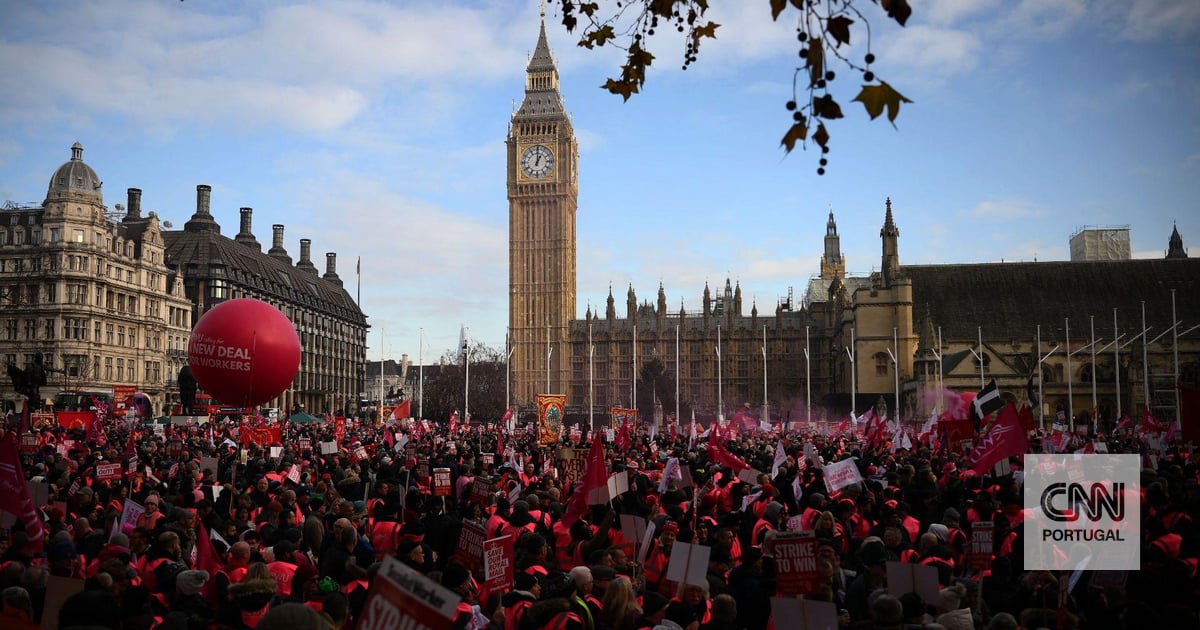Throughout the month of December, not a single day went by without a strike in the United Kingdom, and the British government had already accused the unions of holding the country’s economy hostage. For economists interviewed by CNN Portugal, it is the emergence of pressures created by rising inflation and loss of real wages. Influenced by the Portuguese portfolio. So, why aren’t similar events recorded in Portugal?
England is in the midst of a strike wave that has hit, Without fail, every day of December. All sectors, from health to education, through social services, parcel delivery, schools and courts, will shut down at least four times this month, with estimates of more than a million hours of work lost – the highest number since 1989.
In contrast, Porteta’s data indicates that in the last five years, Portugal had the highest number of working days lost due to strikes at 56 thousand in 2019. The historical high of this indicator has been 382 thousand working days since 1986. lost
At the heart of the British protest are demands for better pay and working conditions, with inflation hitting a 41-year high and energy and food bills reducing households’ room for manoeuvre. Therefore, as Joanna Silva, senior economist of the World Bank points out, “Even with wage increases, services in the United Kingdom average 5%, more than in Portugal, and will suffer a loss in purchasing power “.
In addition, Ricardo Cabral, professor of economics at ISEG and researcher at the Institute of Public Policy, said the strikes are understandable because “the United Kingdom has become more impoverished in recent decades, especially in the last year, due to liberal reforms and privatisation”.
An empty King’s Cross station in central London seen during the December/Getty rail strike
As economist George Padera underlined, this month of continuous strikes is sure to be “the first and most important challenge for the Conservative Party, which may decide the future of Rishi Sunak”. The British prime minister is also dealing with the impatience of his party, which is under pressure in the streets and wants new and swift anti-strike legislation.
Earlier this month, the National Union of Railway, Maritime and Transport Workers, which represents more than 80,000 workers, accused several ministers of “holding the country hostage”, planning strikes over Christmas and rejecting the offer of a 9% rise within two. years. Fresh talks failed this Tuesday, and the Prime Minister himself is not confident a solution can be found. “The government will do everything it can to minimize the disruption, but it can only stop completely if the unions abandon these strikes.”
In addition to transport workers, NHS, British National Health Service and postal workers have launched new rounds of demonstrations this week. Economist Joana Silva recognizes that there is a potential concentration of efforts, but notes that the December period, on the eve of Christmas, is favorable in terms of exposure. “It’s a period of peaks in consumer activity and when you think about a strike, you want to have a lot of impact and people and the government have to look at the consequences and hear the demands”.
Economists note that the heart of British resistance is similar to that experienced by the Portuguese. Real wage loss, housing payments and electricity costs have increased this year, economic sentiment indicators are not favorable, but a month filled with strikes in multiple sectors at the same time is not the least expected. Immediately. On the one hand, Ricardo Cabral explains, “the trade union movement is stronger than in Portugal” and the choice of strike as a tool of resistance, exemplifying Joana Silva, differs “for cultural and historical reasons”.
Sign of one of thousands of Royal Mail/Getty strikers: “Government has failed”
On the other hand, the Portuguese labor law greatly weakened the trade unions in the wake of the intervention of the Troika, which underlines Jorge Padeira, i.e. the “enormous weakening” of labor bargaining power. “The balance of power is completely on the side of employers, people are concerned about protecting their jobs and are very reluctant to claim, they go to job interviews with confidence in their mouths, they don’t even dare to open their mouths. When the desired salary level is there,” he adds.
Joana Silva points to another difference between the Portuguese case and the case in the United Kingdom, which relates to consumer dependence on exponentially more expensive goods. “The United Kingdom has a large number of people paying off bank loans for their homes and Portugal has a very large number of home owners, so an increase in interest rates may have a different societal impact on Portugal and the United Kingdom”.
But Jonah Silva and Jorge Patera agree on another hypothesis. Portugal is likely to record the same scene of “social fatigue” experienced on British streets. “Portugal is not at that stage, but it is starting to accumulate tensions that will one day lead to this kind of situation,” asserts Jorge Patera, “the talk of exact calculations and overzealousness” launched by the government. socially dangerous.”

“Total creator. Devoted tv fanatic. Communicator. Evil pop culture buff. Social media advocate.”

